#wicked is a queer story
Text
Galinda's True Colours
One key theme in Wicked is superficiality. The world of Oz is a place where honest conversation is difficult to come by. Almost everyone is pretending to be something, or believe something, or have something, all to get what they want.
Popular approaches this theme with the subtlety of a hyperactive wrecking ball and gives a musical monologue about how this world works, and why.
Because Galinda has been portrayed as ditsy up to this point, with a bit of the self-serving schemer archetype thrown in for flavour. But here, we see just how intelligent she is. Galinda has caught on to how the world works, and understands what buttons to push.
Let me explain.
SPOILERS AHEAD (Wicked)
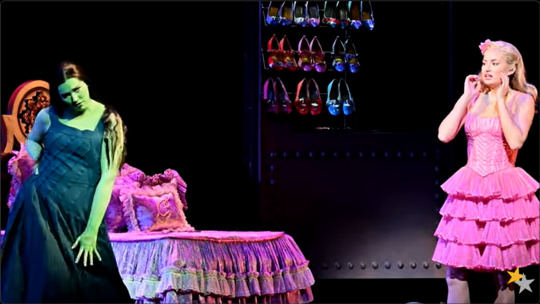
The first element to be brought under examination is Wicked's love for subverting expectations. By this, I mean that certain mindsets in the world have stereotypes associated with them, take idealism and cynicism for example.

From what I have observed, when a writer wants to use one of these archetypes, they will probably draw on a few common ideas. The former is usually portrayed as stary-eyed and naive, or unflinchingly positive. Cynicism meanwhile has a certain sarcasm to it. A cynic might feature a permanent scowl and a dry remark as a kneejerk reaction to anything.
In short, Cynics are usually written to be villains who are overcome by hopeful heroes, or to be heroes who are proven right by a world where hope is meaningless. Idealists on the other hand are either heroes who make the world a better place by sheer force of goodness, or naive fools who the world breaks down.

Obviously, there are exceptions to the rule, but those exceptions are mostly more developed characters in their own right, so the label of "a cynic" doesn't really fit them. Batman is an idealist (when he's written properly).
What is fascinating about Wicked is how the characters are presented. Elphaba is introduced as cynical, she fits the archetype to a tea. But after a musical number, her character swaps entirely. She keeps the sarcasm, but the hopefulness becomes a driving force that goes against the stereotype.
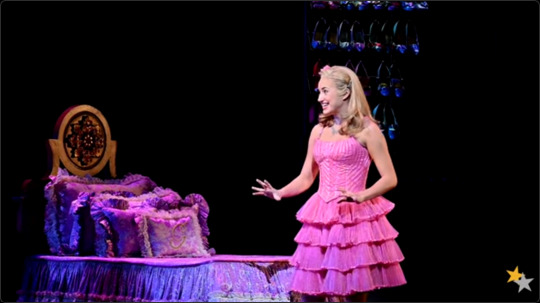
Galinda is... introduced as a bit of a ditz. She's got an ego, she gets what she wants all of the time, she has a well-known family. She's the generic rich kid, essentially. Fiyero gets the same treatment.
For the record, By Galinda, I mean young Glinda, and I am treating them as separate entities until they meet back up.
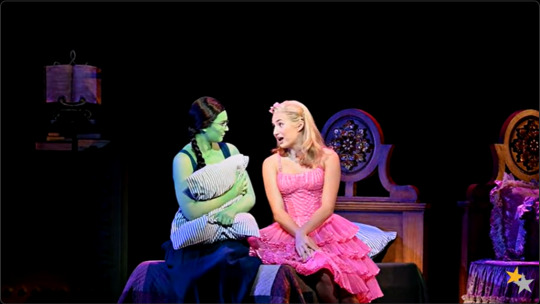
Anyway, when Galinda starts singing, her real worldview becomes clear. It's possible to argue that it wasn't particularly hidden to begin with, but in Popular, she bludgeons you over the head with it.
"Celebrated heads of state
Or 'specially great communicators
Did they have brains or knowledge?
Don't make me laugh!
They were popular!
Please, it's all about popular!
It's not about aptitude
It's the way you're viewed"
As much as I despise it, Galinda is kinda right here.

In 1964, Henry Littlefield published an essay in the American Quarterly titled The Wizard of Oz: Parable on Populism in which he gave some opinions on a theoretical metaphor inherent in The Wonderful Wizard of Oz book (if you don't want to read it, TedEd has a video discussing it and its legacy). He claimed that it was an inherently political book about the time Baum wrote it.
The sparkly new world looks even better if you put on tinted glasses, and only works if you understand that the wizard's power is empty, so Littlefield proposed.
Scholars since have praised, debated, and debunked Littlefield's essay. Pointing out the fact that this is pattern recognition with hindsight, in the same way that you can look to the stars and see a goat.
Essentially, there is an argument for The Wonderful Wizard of Oz being political, and there is an argument (most famously made by its Baum himself) that it is just a children's book.
Wicked is a satire, and not a children's book, so it gets away with some heavy insinuation, but to avoid landmines and a lack of knowledge on my own part, I am going to talk exclusively about how this affects the land of Oz itself, rather than its implications for the real world. Please don't argue in the replies.
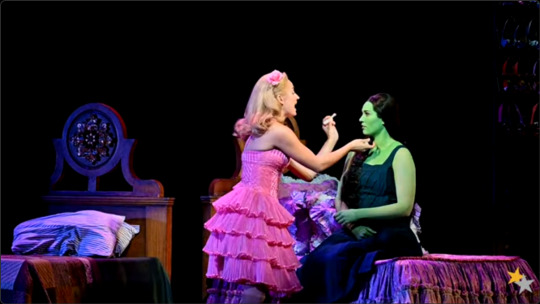
So, Galinda's hypothesis here is that the leaders of Oz do not get to where they are because of any actual skill, but rather because they were well liked by either the people, or their superiors. She gets proven right about this throughout the musical. Madam Morrible moves up in the world by presenting Elphaba to the wizard, the Wizard gained power by giving Oz a common enemy, and Galinda and Fiyero themselves gain status seemingly out of nowhere.
In Oz, it doesn't matter what you know, but who you know, and who knows you.
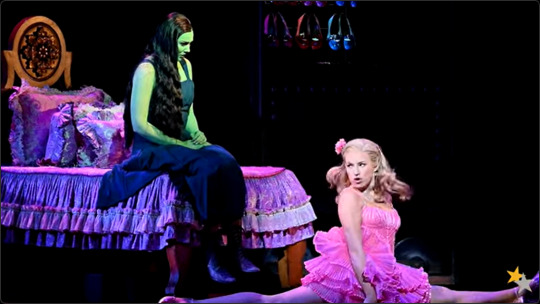
In the show that I watched, Galinda was played by Courtney Monsma, who knocked this number out of the park. Galinda is an incredibly cynical character, but Monsma played her with what I can only describe as "manic pixie energy", which circles back to Wicked's idea of superficiality.
Because the ditzy pantomime of Galinda present in What is this Feeling and half of Dancing Through Life is nothing compared to the madness that is Popular. This is a character who knows exactly how to toss her hair to get what she wants, who knows how to make people think she is something she isn't.
Monsma played a character who was well aware that perception would get her further in life than intelligence, and was having fun with that confidence. But she is actually clever, Galinda has picked up on this fact that everyone else has just accepted subconciously, but now she can explain it.
This song feels like a hyper fixation rant. The frantic obsession was a mere outlet for the excitement of finally being able to speak to this worldview head on to someone who she respects and knows will actually understand her. This song feels like Galinda and Elphaba are on emotional and intellectual equal footing.
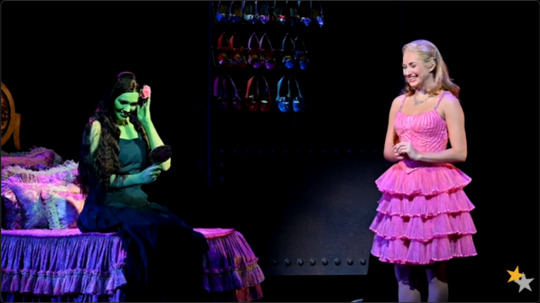
This song is also part of my case for Wicked as a queer musical that only works as a story because the romance doesn't. As in, this is a story about a romance that could have been, and that romance reads as queer to me. I will get more into it next week, but for now, I will say this:
This song doesn't matter, and that's exactly why it does matter.
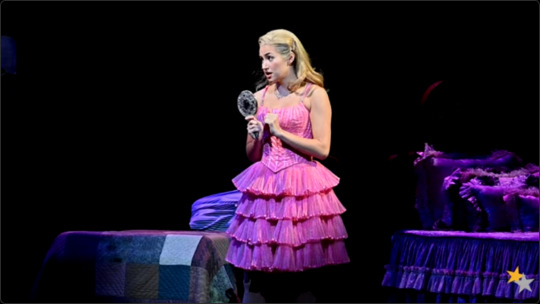
This is the moment when Elphaba and Galinda connect, and share. This is Galinda trying to give back for the wand and make up for her previous behaviour to make Elphaba less of an outcast. But she has already done that.
The moment at the end of Dancing Through Life when Elphaba and Galinda share the spotlight, when Galinda makes herself look like a fool to match Elphaba, when she lets the outcast lead, and the rest of the room goes along with it. That moment is when the romance is kicked off, that is the moment when she starts making amends. That is the moment when she starts to make Elphaba less of a social pariah.
That dance renders Popular superfluous, or at least it does on paper. In reality, this song is doing a lot of heavy lifting in the foreshadowing department, even more so than What is this Feeling, in my most humble of opinions.

Popular happens because Galinda is right about so much in her world, but wrong about the most important thing. Brains and knowledge are irrelevant in Oz, perception is powerful, but empathy rules them all.
Galinda gives this big show of how amazing she is for helping people. Look at her, she's so good. But, Elphaba doesn't care about that, and Galinda does. The romance doesn't work in the end because Galinda realises too late that in the big scheme of things, superficiality is nowhere near as fulfilling as connection. That's why her romance with Fiyero breaks off, and its why her romance with Elphaba is doomed. She only realises this when both options are off the table.
The romance between Elphaba and Galinda breaks apart, but it can only do that because it was there to begin with. You can't tear down nothing.
You could read the relationship as entirely platonic, a friendship that breaks down. But art is subjective, and to me, the romance makes this story so much more compelling.
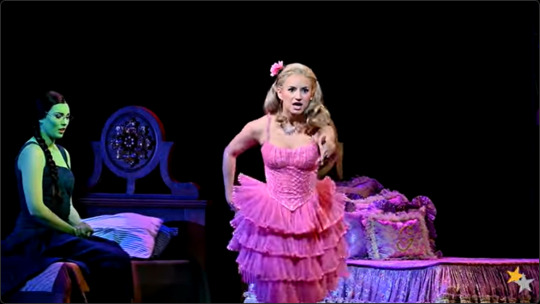
Final Thoughts
Popular is a popular song in the fanbase. It's an absolute bop, but it's also one of the simplest numbers in the entire production. The set is two beds, there is no fancy dancing, just one character sitting still and the other jumping around like she's on springs. The set doesn't change, there are no extra characters, nothing.
This song doesn't let anything distract from the character drama that is going on in centre stage, so that the audience can take in what is actually being said and done.
Next week, I am taking a look at I'm Not That Girl, and I will being going all in on the queer reading of this musical. Although, that is a heterosexual love song, right? How could that be queer? I have thoughts, so stick around if that interests you.
Previous - Next
(Images were sourced from this video)
#rants#literary analysis#literature analysis#character analysis#wicked is a queer story#wicked the musical#glinda upland#elphaba thropp#wicked musical#musical analysis#lgbtq#queer coding#lgbtqia#queer#gelphie
82 notes
·
View notes
Text
My predictions for the wicked movie knowing Hollywood if they include elements of the book (which they should!!!):
-queer bait the shit out of Elphaba and Glinda
-they hired a white guy to play Fiyero so I’m betting they may attempt the whole subverting the race power dynamics thing instead of yknow sticking with the very clear allegories in the book. They also won’t let Fiyero wear his cultural clothing, instead sticking with a very boring suit or shirtpants
-make Elphaba very feminine…I swear the god if they don’t give her a too big man’s coat she wears in the book I will fight someone
- more of a tiktok thing that will happen: ‘Blue diamonds on a green field’ romance trend
-either they will focus too much on the Time Clock Dragon or not at all despite it’s importance to the plot
-if Crope and Tibbit are included, they either will not verbally queer but will either wear leather or have colored hankies (cuz the costume department knows what they are doing), or they will be the opposite of yassified
-they won’t show Tibbit (I think it’s him) in hospice dying of what is implied to be HIV/AIDS (which omg is such a large part of the plot and culture of which it was derived from! The whole ‘friends of Dorthy’ + queer women having to step up and care for queer men during HIV/AIDS crisis in the 80s and 90s and still to this day!!! There is so much subtext in that few pages!)
-the genocide of the Quaddlings for their land’s rubies won’t be mentioned or if it is they will ‘holocaust’-ify it and it will be very disrespectful
-they won’t make the Wizard like ale enough. The whole point in the musical is that he is so charming that even Elphaba is tempted. A fatherly actor, Tom Hanks??, should play the Wizard 🫢
-the Animal animation will either be extremely bad (like the Lion King remake), which is most likely, or they won’t use it at all. And tbh I want to see something like that is in Narnia.
-they will market it like they did the Hunger Games (I honestly don’t have much of a problem with this because I found that fascinating when that happened).
-it’s gonna be so straight. And that’s really sad because this book was written by a gay man, and has sooooooo many references to queer culture and most of the characters are canonically queer in some way. And honestly as depressing as the book is, I read it as a cathartic image of what LGBTQIA+ and POC go through. I think that is why I love it so much- I see myself and my pain and my community’s pain represented in a nuanced way.
-the only thing I can rely on happening is the violence against women 🙄 it’s in everything
I just really want a wicked series that is similar to Game of Thrones (with better writing) mixed with Pose and MASH, and be a political/action/horror thriller like Kingdom (K-drama). I know that’s complicated but it all plays out in my head lol.
I’m holding out this much 🤏🏻 hope.
#elphaba#fiyeraba#fiyero#wicked book#wicked musical#wicked movie#predictions#this is really depressing sorry lol#but I have a lot of feelings about this okay??#it’s a QUEER story but it’s not gonna be told that way#Broadway
27 notes
·
View notes
Text
More neighbor concepts

#furry art#tails of the wicked#town art#original story#mayflower#mange#Bella#rose#Carrie#pyre#Ratkin#nonbinary#pansexual#bisexual#intersex#trans#queer#gay#mlm#goat oc#cat oc#bunny oc#goth bunny#cow oc#spider oc#bat oc#rat oc#furry artist#furry characters
20 notes
·
View notes
Text
me @ myself: I don't care that you're on a Turn of the Screw kick right now for some reason, do NOT look up the wiki for H/aunting of Bl.y Manor. you KNOW you have a massive grudge against '''haunting of hill house'''. you KNOW that whatever it is you're not going to like it
me:
me: i'm going to look up tHoBM
me one episode list read later:
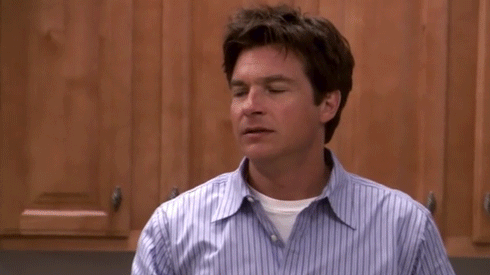
#vic talks#bitchin and complainin hour#what if we took All the gothic out of this gothic story#made miss jessel ONCE again the 'less bad' one beside quint#justice for miss jessel fr hashtag feminism stop making her sad/abused/manipulated/better than quint#they were Villains in Love and she was if anything treated as SCARIER than him#(although part of that Was the mc's classism to be fair)#(and the implications of her abusing flora are there right beside quint abusing miles... But Let's Just Ignore That said every adaptation)#(will shout out to The Innocents at least noting she was particularly close with Flora and making her dancing with Flora a creepy image)#it's. haunting of hill house was insulting bc it was the name of a brilliant book slapped on a completely unrelated story#bly manor is insulting because it takes surface-level pieces and names from a book that for all its flaws#is chock-full of gothic transgression and disturbing themes and questions about reality and reliability#and made it into a simplistic ghost story that's almost completely the opposite of transgressive#queers die ghosts go to the afterlife family members step up to their duty the sick are wicked and we end with a wedding :))
1 note
·
View note
Text
Wicked Queer hosts the first annual documentary festival
The @wickedqueer film festival hosts their 1st annual documentary festival this weekend in Boston (11/18-21). @lgbtq_history (The History Project) co-presents 3 films this weekend. Defintely worth checking out if you like documentaries! #gayBoston
Wicked Queer (a.k.a. Boston’s LGBTQ+ queer film festival) is hosting their first annual documentary festival this weekend, November 18-21. The seven different documentaries will be shown at the MFA Boston and Brattle Theater in Harvard Square. Boston’s History Project has partnered and will be co-presenting three films at this year’s festival.
For more information about showings and to purachase…

View On WordPress
#A Run for More- with Director Ray Whitehouse and Producer Andre Perez in person#All Man: The International Male Story#Casa Susanna#Esther Newton Made Me Gay#History Project#Independent film#LGBTQ Documentary#LGBTQ Film#Nelly & Nadine#The Radical#Uýra: The Rising Forest#Wicked Queer
1 note
·
View note
Text
Heaven's Not Homophobic in Good Omens, and Why That's Important
I need to preface this with, I am not trying to start a fight or argument and won't tolerate any homophobic or bad faith arguments in response to this. Cool? Cool.
This is in large part inspired by this ask from Neil's blog, which sparked some discourse that I don't want to get involved in but that brought up some analytic questions for me.
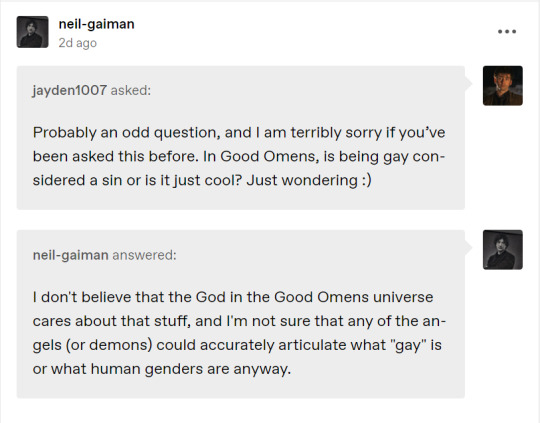
He goes on to reblog a question asking about Uriel's taunt specifically, clarifying that "boyfriend in the dark glasses" can just as easily be read/translated from angelic as girlfriend or bosom buddy. The idea is that an angel and a demon "fraternizing" is seriously looked down upon, not that heaven is homophobic. And that's super important.
We see homophobia in both the book and show, of course. Aziraphale is very queer-coded, intentionally and explicitly so, and we see the reaction of other humans to that several times. Sergeant Shadwell, for example, and the kid in the book that calls him the f-slur when he's doing magic at Warlock's birthday party. These are, however, individual human reactions to his coding as a gay man.
I am, personally, not a fan of heaven redemption theories for the show; no hate for people who want that it's just not something I'm interested in. I don't believe that heaven is good with bad leadership, or that God Herself remains as a paragon of virtue. To me, that's not in line with the themes and messages of the show. It's important, however, that heaven doesn't reflect human vices. Heaven can be nasty and selfish and apathetic in its own right without ableism, homophobia, transphobia, or racism. This matters for two reasons.
Firstly, we don't need the -isms and -phobias to be evil or at least ethically impure. In a world where we spend so much time fighting against prejudice and bigotry, our impulse is to see that reflected in characters whose motivations we distrust or who we're intended to dislike. While it's true that that's often the big bad evil in our daily lives, it can really cheapen the malice in fictional evil from a storytelling standpoint. A villain motivated by racism or as an allegory for homophobia can be incredibly compelling, but not every bad guy can be the physical representation of an -ism. Art reflects the reality in which it's crafted, but the complexity of human nature and the evil it's capable of can't be simplified to a dni list.
Secondly, and I think more importantly, is that for Good Omens specifically, this places the responsibility for homophobia on humanity. If you're in this fandom, there's like a 98% chance you've been hurt by religion in some way. For a lot of us, that includes religious homophobia and hate, so it makes sense to want to project that onto the 'religious' structure of Good Omens. It's a story that is, in many ways, about religious trauma and abuse. However, if heaven itself held homophobic values, it would canonize in-universe the idea that heaven and religion itself are responsible for all humanity's -isms and -phobias and absolve humans of any responsibility. Much like Crowley emphasizes repeatedly that the wicked cruelty he takes responsibility for is entirely human-made, we have to accept that heaven can't take the blame for this. To make heaven, the religious authority, homophobic would simply justify religious bigotry from humans. By taking the blame for religious extremism and hatred away from heaven and the religious structure, Good Omens makes it clear that the nastiness of humanity is uniquely and specially human and forces the individual to take responsibility rather than the system. Hell isn't responsible for the Spanish Inquisition, which by the way was religiously motivated if you didn't know, and heaven isn't responsible for Ronald Reagan.
This idea is perhaps more strongly and explicitly expressed in the Good Omens novel, in the scene where Aziraphale briefly possesses a televangelist on live TV. It's comedic, yes, but also serves to demonstrate that human concepts of the apocalypse and religious fervor are deeply incorrect (in gomens universe canon) and condemn exploitation of faith practices. Pratchett and Gaiman weave a great deal of complexity into the way religion and religious values are portrayed in the book, especially in the emphasis on heaven and hell being essentially the same. They're interested in the concept of what it means to be uniquely and unabashedly human, the good and the bad, and part of that is forcing each individual person to bear the brunt of responsibility for their own actions rather than passing it off onto a greater religious authority.
Additionally, from a fan perspective, there's something refreshing about a very queer story where homophobia isn't the primary (or even a side) conflict. The primary narrative of Good Omens isn't that these two man-shaped-beings are gay, it's that they're an angel and a demon. The tension in their romantic arc arises entirely from the larger conflict of heaven and hell, and things like gender and sexuality don't really matter at all. Yes, homophobia and transphobia are very real, present issues in our everyday lives, but they don't have to be central to every story we tell. There's something really soothing about Crowley and Aziraphale being so queer-coded and so clearly enamored with each other without constantly being bombarded with homophobia and hate. It's incredible to see a disabled angel whose use of a mobility aid makes no difference in their role and to see angels and demons using they/them pronouns without being questioned or misgendered. It's all accepted and normalized, and that's the kind of representation that we as queer people deserve.
#anywho that got real long#good omens#neil gaiman#terry pratchett#media analysis#good omens analysis#queer coding#queer representation#ineffable husbands#gomens#aziraphale x crowley#anywho happy valentines day#love my fandom#not beta read or majorly edited because I'm a busy guy with homework so lmk if there's any errors that need correcting (politely!)
276 notes
·
View notes
Text
Sapphic vampire fiction mini reviews, ranked from least favorite to most:
House of Hunger: Bland characters, a story that barely scratches the surface of the implications of its premise, and a central relationship with nothing underpinning it make for an aimless story with a climax that hits like a limp noodle. If the dynamic between a vampire and her indentured maid appeals to you, try The Wicked and the Willing instead.
An Education in Malice: For a Carmilla retelling, the titular character really lacks bite. Laura at least has some interesting contradictions in her, and De Lafontaine could be quite compelling if we saw things through her eyes, but the central relationship isn't built on a lot, and Carmilla herself is really disappointingly bland. The prose comes off as overwrought and melodramatic in the first act, and the constant leaning on poetry feels gratuitous, but it picks up steam and becomes appropriately gripping by the one-third mark, and it carries the book enough that I had an enjoyable but rather shallow experience. I struggle to think of a reason to recommend this over In the Roses of Pieria, which plays with similar thematic and aesthetic elements much more adeptly. Also, it's a pet peeve of mine when a story makes a point to establish a specific historical era for its setting but has characters that feel utterly modern.
The Deathless Girls: This book does a much better job with its sense of time and place, and the characters and their motivations are quite strong. I only rate this one low on this list because the main characters don't actually deal with vampirism as a condition until the very end of the book. On its surface, the premise might seem quite similar to A Dowry of Blood, but there's actually very little thematic or narrative overlap.
Ex-Wives of Dracula: An excellent exploration of the queer teenage experience in conservative small town ~2015 USA along with some pretty novel twists on vampire and horror movie tropes. Strong, vibrant characters with a rich, messy, and compelling relationship carry a solid mystery plot and some pretty pointed critiques of its setting, but the actual climax and resolution don't quite hold up to the quality of the rest. Also I simply must warn anyone who didn't grow up in the time and place this book explores about the profound and casual bigotry and nastiness of that setting, which this book replicates to a T.
The Wicked and the Willing: A thrilling and compelling dark romantic drama centered on a British vampire in 1920s Singapore, her newly hired and desperate to escape poverty personal maid, and her majordomo who is struggling to keep her conscience under control after years of aiding and abetting her mistress's dark appetites. Extremely strong character writing pairs with deft exploration of themes of colonialism, entitlement, class divisions, sexism, and the ways in which certain types of status can and cannot afford one leeway to be nonconforming in other ways. Intermixes diagetic and non-diagetic BDSM very organically also, if that's your thing.
In the Roses of Pieria: Rich prose dripping with atmosphere follows an obscure academic as she digs into a series of ancient correspondences and discovers a millenia spanning love story between two vampires. The character writing is solid, if not quite as impressive as some other entries on this list, but the quality of the prose more than elevates it. The text makes elegant and powerful references to Sappho throughout, and the whole experience is heady and compelling in ways that I struggle to describe in greater detail. Funnily enough, the vampires are the least interesting part of the world building. This one has a sequel coming, and I can't wait.
A Dowry of Blood: A darkly enchanting epistolary novel that takes the form of letters written by the first of Dracula's wives to him as she attempts to make peace with killing him. She unpicks a delicious and horrifying knot of feeling and history as she revisits their millenia together, recounting and reckoning with the manipulations and abuses that defined the good times and the bad. The characters are evocative and rich, the narrative voice by turns sparse, longing, furious, contemplative, and mournful, and the story simply springs to life. It accomplishes an incredible amount in approximately 200 pages, and I absolutely cannot recommend this one enough.
#the wlw review#im sure there are countless more sapphic vampire stories#but these are the ones ive read#ignoring a few outliers that don't really explore vampirism
87 notes
·
View notes
Text
a storytime story. Not my story, it's my friend's, but she doesn't go here so I'm sharing for her. We'll call her Mara. Mara is a high-femme, lovely queer girl from a wealthy family in the southern US, but when I met her she'd been living in California for many years, chugging through her postgraduate education in Women's Studies. She rarely went home, because being at home was always a bit of a fraught experience: not unendurable (because to most heteronormative casual viewers the radiant queerness of a high-femme is pretty much indistinguishable from a quirky beauty queen waiting for the right football quarterback to sweep her off her feet), but still--not the most fun. Yet every once in a while, Mara would have a fit of 'dutiful daughter'-itis, and go home to mend some fences and keep some peace.
Mara's mother had often asked her to come with her to philanthropic events, but Mara had always said no. On this trip, however, Mara's mother had purchased a full table as an event sponsor, and she cajoled Mara into going with her. For those of you who haven't ever attended such an event, they are all different, and yet terrifyingly all the same (and I say this not as an attendee, but as an event-runner for various nonprofits; an event-runner who, fair warning, hates everything about these events, and this part of nonprofit work). There is some form of lower-calorie food (chicken or fish on greens with a very light citrus-fruit dressing is de rigeur, along with some sort of fruit-based airy parfait served in the smallest and most elegant glasses imaginable for dessert), usually an emcee (occasionally entertaining, but always inoffensive to the assembled guests), sometimes speakers (high-profile or famous women on a local or national level depending on the 'get' of the organization in question, or extremely well-spoken young people or teens for youth-serving organizations--with the youth in question being very carefully coached), and an 'ask'--the fundraising portion of the event, where the wealthy attendees compete with the rest of their friends and enemies in the social scene to be the most gracious and beneficent person in the room.
And there is gossip. So much gossip.
Poor Mara knew enough to expect some of this (mostly due to listening to me complain bitterly about how awful these events are), but there were aspects for which she was completely unprepared. Her mother had filled her sponsorship table with all of her closest friends, and the 'social hour' before the event started in earnest was a haze of white wine and a constant stream of excessively perfumed women dressed in full southern socialite chic, coming by the table to air-kiss cheeks and say how it's been ages since they've seen each other and what a darling ensemble, where on earth did you get it? and who does your hair now?--you must tell me, it's simply scrumptious--you look incredible, we really must do lunch some time soon--
...and the moment the woman or women in question moved on, the table, as a whole, in excited, urgent-whispered voices, would drag the everloving fuck out of every single lady they'd just been gushing over.
"Did you see how botched her last lift was? I hardly recognized her--I'm surprised she recognized me, with her eyes yanked back like that--" "so terrible, but she did go to the cheapest surgeon in town--husband has money troubles, you know--"
"Didn't expect to see her here, but I suppose you have to go somewhere to show off that large a collection of paste jewels--" "oh, stop, you wicked girl! But you're right, of course--and she gives herself such airs, like we don't all know--"
"Poor dear looks exhausted--apparently keeping up with her pool boy isn't easy at her age--" "Can't say that I blame her; that Carlos, have you seen him? Of course, she's hardly his only client. I've been dying for a pool, but my Henry just won't--"
"Quite a plucky little attitude for someone whose husband just left her for his twenty-two year old secretary--" "And after she put him through college and law school--I heard she's not even going to get to keep the house. She really should have sprung for a better lawyer--"
"I can't believe she still thinks she can fit into that dress, with all the weight she's packed on--" "Truly grotesque--just ghastly! Seems like last summer at the fat farm didn't do her as much good as one would have hoped--"
::giggle:: ::giggle:: ::giggle::
Mara was horrified, sitting there with a bland, polite smile frozen on her face, with her white gloves and vintage pillbox hat and charming little clutch bag, her seamed stockings and her kitten heels and her classic red lipstick and pin-curls (because in true unquenchable femme spirit, she had taken this occasion as an opportunity for dress-up, an opportunity for fun and play and sexy whimsy--a Gene-Tierney-does-pin-up-girl kind of vibe), utterly unable to see how to extricate herself from this terrible situation.
Another woman glided away from the table, coyly waving heavily-beringed fingers. "Yes, Darling," Mara's mother said, coyly waving back. "See you soon! Kiss-kiss! Love to Laurent!" She sat down and hissed to the cabal at the table: "Ha! Her husband just gave her an STD."
The woman to Mara's left leaned forward excitedly. "Really? Two-door or four-door?--wait, if it was the latest Aston Martin, I'm going to literally perish of envy--"
And that was the tipping point--Mara fled. Walked until she found a suitably divey coffee shop. Had a coffee and a slice of peach pie, and flirted with a soft Butch waitress until the world seemed less dire.
#storytime tumblr#'Mara' - thank you for sharing your story with me and letting me share it with others#because it's hilarious and so accurate#and i'm so glad you made it home after this ordeal#seriously though - fundraising events are the fucking worst#rare ass personal post
61 notes
·
View notes
Note
sorry if you have already answered this, but are we getting any queer rep in Long Live Evil? 💕 i am super excited to see what you've cooked up for us either way!
I came back after I'd gone off on one, seeing the post had struck a chord and being thankful but fearful of my inbox. Let me say with delighted surprise that all the asks are very kind.
Thank you for this one, sweet anon. I am so excited and so nervous about my best beloved, Long Live Evil, and about coming back with a new book of my own after so long, when I believed for a long time it was hopeless.
I'm really grateful to find readers waiting for me. But I know readers are naturally more invested in characters they know: I extremely appreciate you taking an interest in the future.
So, short answer: YEAH you are!
Long answer: Long Live Evil wouldn't exist without its queer narratives.
C.S. Pacat and I were talking in our virtual Brookline Booksmith event recently about our favourite Disney villains. C.S. Pacat picked Maleficent, a fine choice. I picked Snow White's Evil Queen. We agreed we loved most of them.
Here's the relevant excerpt I was quoting in my last post from Carmen Maria Machado's In The Dream House, saying 'I think a lot about queer villains, the problem and pleasure and audacity of them.' Well... me too.
I think many of us have experienced feeling made wrong in some way - for not wanting what society said we should or being what we were expected to be - and that one step along that journey of discovery is going 'Okay, if it's wicked, I'll just BE wicked.' And that's part of why those characters appeal - because they seem free, and free of pain.
But modern storytelling isn't confined to coding, and audiences can now feel free to expect, not the certainty, but the possibility characters who aren't introduced as such still might actually turn out to be LGBT+. The essays I've read about Supernatural, Teen Wolf, Sherlock, Ted Lasso, Fox 9-1-1... I think the latest argued Jaime Lannister was bisexual. (Pretty persuasive.)
I remember reading the Raven Cycle going 'oh? OH.' I remember being at a writing retreat in 2013 and running through the halls screaming about Nico diAngelo. Ten years later we got a Nico diAngelo book co-written by Rick Riordan and the amazing Mark Oshiro. I watched Red, White and Royal Blue with a friend and she said 'honestly I hope the guys get together, but...' and I (having read the book) silenced myself with a herculean effort and watched her hopes come true. I didn't know about The Seven Husbands of Evelyn Hugo and almost dropped the book in a swimming pool. But I've also read and watched many things thinking, just maybe... oh, no. Still that hope existing is meaningful, the thought that if the story had gone differently, if this revelation had happened, if this realisation had happened, if, if, if...
Long Live Evil is a story about the story going differently and asking yourself questions about your own nature, and the escape to fiction of those who really need escape. The book is based on that 'if,' and the 'if' itself is joyous, and brings me back to the idea of gleefully transgressing the narrative that much villain love is based on.
It's also an ensemble story with a rogue's gallery of characters and multiple PoVs. (I was much inspired by the Six of Crows ensemble.) So it isn't about any one character's romance, and by the book's nature there exist many possibilities. A critique partner read and said 'I didn't know you were going THERE' and I responded 'Should I?'
I've never been one to confirm where stories are going, and I won't do so now. I'm not talking about any one character or telling you a direction.
I'm just saying yes to rep. It's baked in.
#long live evil#supernatural#teen wolf#fox 911#lgbt reads#six of crows#evil queen#maleficent#red white and royal blue#the raven cycle#in the dream house#cs pacat#percy jackson
70 notes
·
View notes
Text
Wicked's Existential Crisis
Deception is a big theme in Wicked. I don't think this is news to many people. The wizard is a wizard, truth is truth, happy is what happens when all your dreams come true.
Galinda embodies this pretty heavily, but so does Fiyero, although they do so in similar ways. They both lie to others, and realise that they have been lying to themselves later on.
But, you need a baseline before you get to character development. You need a benchmark for everyone to either move up or down from, depending on the genre.
In my opinion, Dancing Through Life establishes that benchmark, while asking a few more philosophical questions as it does.
Let me explain.
SPOILERS AHEAD
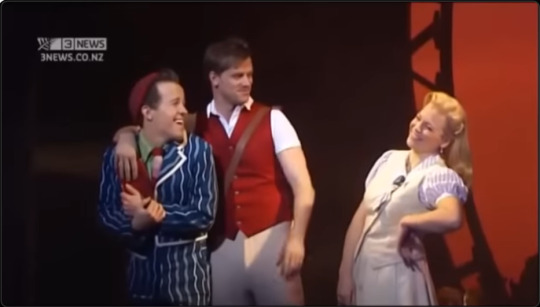
"Dancing through life,
Down at the Oz Dust
If only because dust
Is what we come to.
Nothing matters,
But knowing nothing matters,
It's just life
So keep dancing through"
Fiyero, buddy, friend, pal... are you ok?
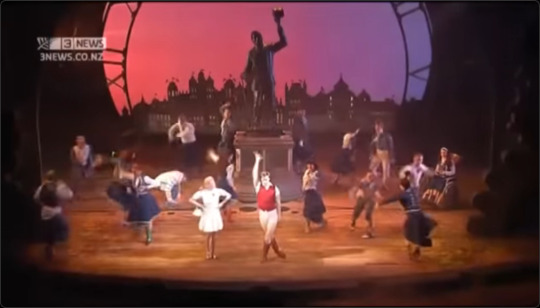
Dancing Through Life is the introduction of Fiyero, and there is a enormous difference between what he is saying and how he is saying it.
That dust line is actually a biblical allusion, with various Judeo-Christian books and prayers claiming that G-d created humans from dust, and that when someone dies, they return to that dust. Hence the "ashes to ashes, dust to dust" saying (source). So, Fiyero is nihilistic.
"Nothing matters, so why bother trying" is such a morbid idea, and its usually associated with emo music, either lots of drums and raw emotions, or quiet and sad. So, when Fiyero sings it as a musical theatre, bombastic full orchestra song, his message flies under the radar because it is so dissonant with the style.
That's the key here. Most of the time, people are nuanced, and stereotypes do not encompass the human experience at all. The emotionally confused or depressed or spiraling person isn't the one who sits in the moonlight writing sappy poetry, it's the person who manages to hide it the most easily because they've been doing it for the longest.
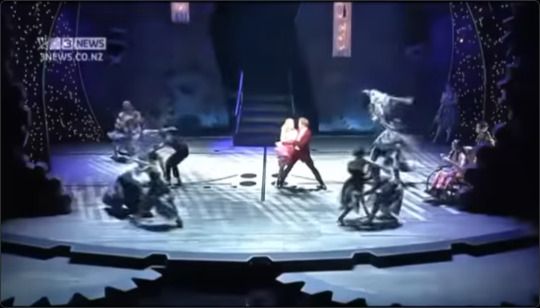
Fiyero is putting up a mask to hide his insecurities, and he is doing it by... not wearing a mask?
Lampshading is the practice of softening elements in a piece of media, letting the audience know that something is out of order or farcical, and turning it into a joke. Overly Sarcastic Productions (@comicaurora) has a video explaining the trope in detail.
In a weird way, this is what Fiyero is doing. He is turning his own crisis into a joke. He doesn't have to hide it if he can poke fun at it. He becomes self-referential, and tells people to move on past the words he is saying and focus on the fun dancing and music.
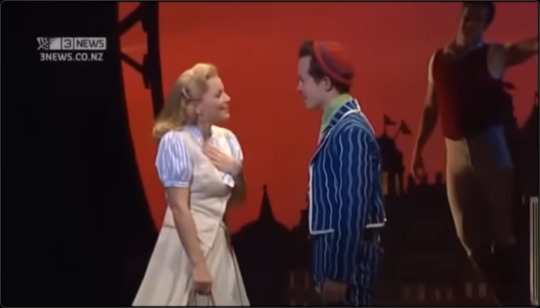
I see where Fiyero is coming from, here. Purpose is difficult to find in this world, and it definitely seems like neither good or bad are rewarded, and luck will do what it will. But I would like to present a counter point.
Everything Everywhere All At Once was easily the most emotionally powerful film of 2022, and it also discussed nihilism in detail. I don't want to get into plot spoilers, but this movie asks the question: If nothing matters, then what?
And the answer to this is clear: Everything. In a Cinema Therapy video on the film, Johnothan Decker states this:
"If nothing we do matters, then the only thing that matters is what we do."
Actions have whatever meaning we ascribe to them, and if we ascribe no meaning to anything, then everything has meaning on the same level. If nothing matters, then everything matters.
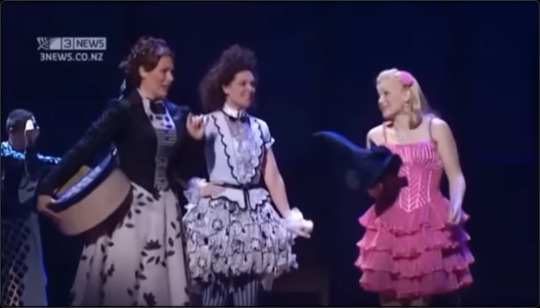
This segways into another core question of the musical and especially this song. Do intentions matter?
Galinda and Elphaba have a comedy of errors with the gift giving, specifically when Galinda sets up Nessa with Boq, and Elphaba arranges for her to receive a wand in return, contrasted with the infamous hat.
Galinda does things for personal gain, and accidentally makes someone's life slightly better for a moment, and Boq kind of does the same. Neither of the two cares about Nessarose, but they bring her happiness in the short term.
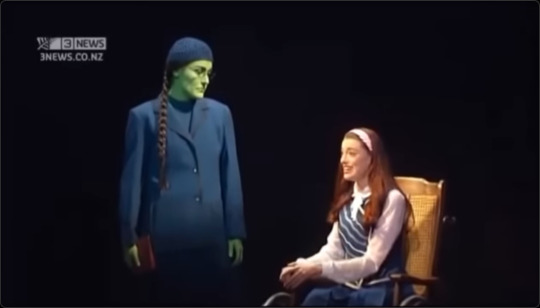
"We deserve each other, and Galinda helped it come true."
I mentioned in my post about The Wizard And I that this theme comes up there first, in association with meeting the wizard, and I think there is something else to it than just deception. Don't get me wrong, this is deception at work, Elphaba with the Wizard and Nessa with everyone around her. But that lie has a positive result here, for the moment.
It also separates the consequences from the intention. Elphaba sees the wizard and wants to improve the world, her hopes are on rocky foundations, but her actions are strong, and I have already mentioned what Galinda's actions do.

However, I would argue that intentions do matter, and that this musical agrees with me, and that is with Boq, a person whom I despise.
As a character, Boq is fascinating. He is a direct satire of the hopeless romantic of stereotypical fairy tales, think Ariel from The Little Mermaid, or Lancelot from the 1963 movie, Lancelot and Guenevere. Boq is trying desperately to court someone who does not care about him and has someone who does care fall from the sky in front of him, but he can't see past himself.
Now, pining is all well and good, you are allowed to pine, and if someone is attracted to you, there is no law that says you must be attracted back. But Boq goes a step further.
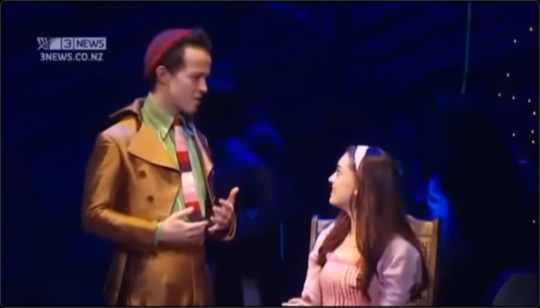
"It's because I'm in this chair
and you felt sorry for me.
Isn't that right?"
"No! No!
It's because you are so beautiful."
Boq had an opportunity to back out of the romance handed to him on a silver platter. He could have said it was just a dance, or even confessed that Galinda put him up to it, if he so desired. But Boq made a choice to keep stringing Nessarose along. He may have his reasons, but I think his actions are not excusable, and the gut punch at the end of the musical when he tells her that he never cared is a betrayal that could have been so easily avoided.
Boq and Fiyero go on to become key players in the "death" of the Wicked Witch of the West, and they do so for alternative reasons, and it reframes Dorothy's journey.
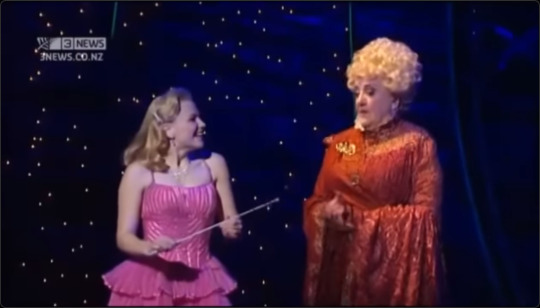
For a more nuanced explanation of what I mean, consider this: In 2019, youtuber Hbomberguy (Harry Brewis) raised $347000 for a Brittish charity organisation called Mermaids in a livestream of Donkey Kong 64, and he gave a speech in October of that year about why he did such a thing.
"I think secretly, we're always making one of two decisions, and we make that decision even if we don't know we're making it. You're either choosing to make life worse for someone you don't like, or better for people you care about.
There is an actual difference, and I didn't realise I made the wrong choice until a lot of people came over and helped change the choice retrospectively."
What you are trying to do matters, because if you keep trying to do good, even if you hit roadblocks, if you are truly committed, you will eventually do some good in the world.

I actually like Brewis' definition of right and wrong here, because it isn't overly philosophical, it pertains to individual actions. You either make someone else's life better or worse.
I have been rambling around my point for a while, so let me make it concise. Dancing Through Life asks philosophical questions about life. What matters? Is it you? Is it your actions? Is it your intentions?
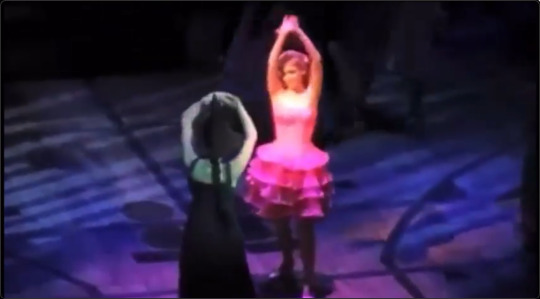
Final Thoughts
There are two other things I need to mention before I finish. First up, the extras are some of the best parts of this musical, and in this song, that is driven home. Everything comes across as so superficial, and not in a "that's bad acting" way, but in a "that's an actor playing a character who is acting" way. This carries over to Galinda's entire style of talking, but the extras knock it out of the park here. It means that the only sincere moments in the song hit with the relevant weight. Those being Elphaba and Nessa's conversation, and the Elphaba dance (something remarkably difficult to find images of).
That dance is the moment I see Glinda x Elphaba (I still refuse to use the Gelphie ship name) actually taking off, rather than in What Is This Feeling, because it's the first moment that the two see eye to eye, and Galinda finally understands Elphaba. She earns her friendship and trust by trying to make up for her mistakes. Galinda talks a lot, but actions speak louder than words, and that dance kicks off a love story.
Next week, I will be diving into Popular, a number that really takes apart the theming to an overt level only matched by one other song, and we will get to that one soon.
Previous - Next
#rants#literary analysis#literature analysis#character analysis#what's so special about...?#wicked#wicked the musical#elphaba thropp#galinda upland#wicked musical#gelphie#wicked is a queer story#fiyero#elphaba#glinda#long post
71 notes
·
View notes
Text
"You're not the person I want to explain myself to." -Eris Vanserra and his hidden motives
The story of Eris Vanserra haunts me. At this point, most of the characters in ACOTAR are an open book in terms of their backgrounds but Eris's is still so shrouded in mystery and I have to know more. Consider this the inspiration for my following lengthy analysis of all the Eris Vanserra scenes we've been given. Additional inspiration being this clip of SJM from a since deleted live stream on Instagram (still available on YouTube) :
Love that SJM says that Eris is her favorite Autumn Court character but more importantly she spills a little detail about Eris having a secret history and a secret motivation behind his character. I think most readers assumed by now that Eris is primed for a redemption arc but this simply could've been reserved to him making amends for leaving Mor injured in the woods. No, this is something more than that- something significant that affected his actions back then and is still influencing them now.
Let's start breaking everything down:
Everything starts with: Eris found and left Mor in the woods at the Autumn Court border after she was tortured dumped there by her father, Keir.
Why did he do this?
“I knew why you did it... So I gave you your freedom, ending the betrothal in no uncertain terms" - Eris in ACOWAR
After Mor slept with Cassian, Eris knew Mor did it because she wanted out of the engagement (for a secret reason- on her end- that we'll touch on in a bit) so he ended the betrothal as she wished.
But why did Eris leave her there, injured with fatal wounds? This is still the biggest point of hostility between him and the IC.
"There were forces at work that you have never considered," Eris said coldly. "And I am not going to waste my breath explaining them to you. Believe what you want about me" - ACOWAR
What are these forces?
We're given an answer to this question during a scene in ACOFAS when Mor is recalling the memory of that day at the Autumn Court border.
“No one touches her,” he said. Eris. “The moment we do, she’s our responsibility.” Cold, unfeeling words. “But—but they nailed a—” “No one touches her.” - ACOFAS
If Eris or his men provided aid to Mor she would've become their responsibility, implying that she would've become a ward of the Autumn Court essentially. This is probably why Keir even dumped her on the border in the first place, because he knew that if the Autumn Court provided her aid they would have to assume responsibility for her. It was created as a lose-lose situation for Mor: get help from Eris and be trapped at the Autumn Court or be refused help and left to suffer and potentially die in the woods.
“I take it you do not wish to live here, Morrigan.” She would rather die here, bleed out here. She would rather die and return—return as something wicked and cruel, and shred them all apart. He must have read it in her eyes. A small smile curved his lips. “I thought so.” -ACOFAS
He knew she'd rather die than live there so he acted according to her wishes, even though it was done cruelly. This scene, which we're given from Mor's perspective, shows that she heard the true reason why Eris refused to provide her aid but because of the trauma of the whole situation she likely never put two and two together.
But the situation is a bit more complex than that. There is more to the reason that Eris left her in the woods to have her freedom.
“Eris nodded to where Mor watched them from beside Feyre and Rhys, her face neutral and aloof. “She knows the truth but has never revealed it." “Why?” “Because she is afraid of it.” - ACOSF; dance scene between Nesta and Eris
Eris knows something about Mor that she's afraid to reveal. What's the only fact we know about Mor that she's been hiding her entire life? That she's queer. It seems somehow Eris was aware of this.
“Eris looked between them, smiling faintly. Secretly. As if he knew something that Azriel didn’t. "I knew why you did it" Again that secret smile that had Mor shrinking." -ACOWAR
Later on in ACOWAR, we find out the big secret Mor is hiding is that she's romantically attracted to females. Alright, so somehow Eris knew Mor was queer back when they were betrothed. It seems that this was part of the reason he left her to her freedom.
Despite the cruel nature he's described to have, Eris keeps the knowledge that Mor is queer to himself. Eris left Mor in the woods because he knew she wanted her freedom and the reason she wanted her freedom was because she is queer. Out of some uncharacteristic kindness, Eris won't share this information with the rest of the IC because he seems to not want to out her because he knows she's afraid of the truth. Refer to the quote between Eris and Nesta above for proof of this.
But what are Eris's own secret motivations in all of this?
“So I gave you your freedom, ending the betrothal in no uncertain terms.”
“And what happened next,” Azriel growled.
A shadow crossed Eris’s face. “There are few things I regret. That is one of them. But … perhaps one day, now that we are allies, I shall tell you why. What it cost me.”
This is such an important line and one that if you don't dissect it properly, you won't understand it's real meaning.
"What it cost me". The cost that Eris is referring to is one that he suffered as a result of leaving Mor unaided in the woods. NOT from breaking the engagement, from leaving her. "The cost" is something that would've been unaffected by breaking the engagement (because Eris has no remorse over that) but affected by abandoning an injured Mor (because this is what Eris labels as one of the few things he regrets). Mor being left in the woods was, in the grand scheme of things, inconsequential for the rest of Prythian. The only people negatively affected by it were Mor and the rest of the IC.
"Perhaps one day... I shall tell you why" when Eris says this, he means: perhaps one day he'll them why he regrets it, NOT why he did it. It's important to read this quote in the context of its surrounding passages because you'll see that he had an opportunity to explain why he left her but he instead tells Mor he's not going to "waste his breath explaining it to her."
So after breaking down those lines we know: Eris regrets abandoning Mor because of something it cost him in relation to the IC now hating him after the events at the border but "the cost" is something he's hesitant to reveal to them.
For the sake of the analysis, let's go over a few things we know Eris does canonically care about and why they are not the cost he's referring to:
His father's throne: It's not secret that Eris wants to usurp his father. Feyre even notes how startled she was to hear Eris discuss killing his father so blatantly. Also, if the marriage to Mor would've aided Eris in taking the throne then Eris would've expressed remorse at ending the engagement but he didn't. He only regretted leaving her injured.
His mother, Lady of Autumn: The text shows us that Eris is concerned over the welfare of this mother when he angles his body to protect her during the High Lord meeting scene. However at the time of Eris's betrothal to Mor, his mother wasn't miserable in her marriage the way she's described now. It wasn't until LoA's affair with Helion was revealed, which happened decades after the Eris and Mor situation, that Beron began abusing his wife. Of course, Eris undoubtedly wants his father dead because of this but we know it's not "the cost" that Eris references since it wasn't a factor at the time.
“Helion shrugged. “On and off for decades. Until Beron found out. They say the lady was all brightness and smiles before that. And after Beron was through with her. You saw what she is.” “What did he do to her?” “The same things he does now.” Helion waved a hand. “Belittle her, leave bruises where no one but him will see them.” - ACOWAR
Lucien: Eris has a soft spot for Lucien but he wasn't born for decades after everything happened so he can't be a factor in why Eris regrets his actions.
His father tortures him: It's revealed at the end of ACOSF that Beron tortures Eris after Cassian realizes Eris is injured after returning back from Autumn. We're not told how long it's been occurring and Eris is extremely reluctant to speak on the matter. However, if this was the big secret Eris has been hiding there'd be a bit more emphasis placed on the reveal. In fact, Cassian pushes him again after that to tell him the true reason he left Mor on the border (keep in mind Cassian doesn't know Mor is queer and Eris is refusing to reveal that information to others) and asks Eris for the real reason he's back the Night Court trying to make amends.
Why is Eris back at the Night Court after everything that happened, pushing so hard to build an alliance?
When pushed for the truth, Eris tells Cassian:
"You're not the person I want to explain myself to" - ACOSF
Cassian assumes Eris means Mor and tells him she won't want to hear his explanations anyway. But is Mor really the person Eris was referencing. I think not, given we've been given these lines:
Eris nodded to where Mor watched them from beside Feyre and Rhys, her face neutral and aloof. “She knows the truth but has never revealed it." -ACOSF
"There were forces at work that you have never considered," Eris said coldly. "And I am not going to waste my breath explaining them to you. Believe what you want about me"- ACOWAR
Eris says that Mor already knows the truth and has explicitly said he doesn't care what she thinks about him. He has nothing to explain to her. And aside from those two facts, which already make it clear enough that Mor is not the person Eris meant, what more would Eris gain from speaking to Mor? Assuaging his guilt? That could be a reasonable explanation if it weren't for Cassian already asking Eris if guilt is what was motivating him, Cassian realizing it's not and pushing for Eris to "give me a damn answer".
"You're not the person I want to explain myself to"
So, who in the IC does Eris want to explain himself to?
Mor? No, for reasons stated above
Cassian? No, they're speaking in that scene and if Cassian were the person then Eris wouldn't have said that
Feyre? Nesta? Elain? Weren't alive so aren't applicable
Lucien? Wasn't alive during the incident and is thus unaffected
Rhysand? We're told in ACOSF (Chapter 7) that Eris already has Rhysand's trust and allyship
Amren? I guess I can't necessarily eliminate Amren as the person Eris wants to explain himself to but let's be real, it's not her.
Azriel? Hmm....The person who arguably hates Eris more than even Mor herself. Who has such a burning passionate rage towards Eris that he attacked him during a High Lord meeting, yet also dropped everything to fly to the Continent to save Eris when he was abducted by Koschei.
Conclusion and remaining questions
Let's put everything together:
Eris is back at the Night Court attempting to smooth things over, make amends, and build an allyship. On the surface, we're told it's all because he wants the throne. But what we now know from SJM (in her interview) and our textual analysis is that Eris paid a big, deeply personal price due to the fall out of leaving Mor injured at the Autumn Court border. This cost was directly tied to the IC's perception of him. Eris lost something or the chance at something when the Night Court began to hate him. So he's back, 500-ish years later, attempting to make amends because of the same problem that plagued him all those centuries ago. We also know there's only one person he's interested in explaining himself to- and that person interestingly seems to be Azriel. Why would Eris want to explain himself to Azriel? Why go to these lengths to make amends with him? Was "the cost" Eris paid 500 years ago tied to Azriel?Is this all tied to Eris's "secret history and secret motivations" that SJM referenced? Crack theory time: What if Eris and Azriel are mates? If they are, it would seem maybe Eris knows about it but Azriel isn't consciously aware? It could explain Azriel's extreme and passionate reactions to Eris. What if when Eris became an enemy of the Night Court he lost his chance at having a connection to his mate. It would also explain why Eris is so tight lipped about his secret motivations. We know that Beron tortures Eris as he is now, imagine what he would do to Eris if he found out he was queer. If Eris is queer it would also explain his empathy to Mor and his reluctance to tell her truth to other people. This could also explain why Azriel is the one person Eris wants to explain himself to, because Azriel is the only person whose opinion he cares about. AND this would also provide an answer to the great "Azriel mate debate". I know Gwynriel is a popular theory but the text has not given us any indication that they are (yes, bonus chapter included) and Azriel had never displayed any mate-like behavior around her. Eris and Azriel also provide interesting foils to one another: flame and shadow- which is a theme that's mentioned in both of SJM's other series. We also know how much SJM loves her enemies to lovers.
"There was an icy rage in Azriel I'd never been able to thaw" -Rhysand in ACOMAF
Azriel is routinely described as icy and frozen, physically and emotionally. What better to thaw ice than fire!
If you read this far- thank you and ily.
Feel free to let me know if you have any critiques to my reasoning!
#acotar#acosf#acowar#acotar theories#eris vanserra#eris apologist#azriel#azris supremacy#azris#azris theories#cassian#morrigan#sarah j maas#sjmaas#sjm#acofas#what was the cost#the cost!!#what is he hiding
141 notes
·
View notes
Text

Sugar
He/him
Mouse
A sweet chef who loves to cook and bake for his friends. Considered perfect for a cute, normal, or sweets neighborhood.
#tails of the wicked#furry art#town art#original story#furry character#queer#artblr#mouse oc#Sugar#digital art#digital artist#furry#furry artist#mouse
9 notes
·
View notes
Text
Lesbian Sci-Fi Bounty Hunters Fight For Their Freedom in GL Space Western Apollonia

Sponsored by War Bunny
Apollonia is a no-punches-pulled cowgirls in space adventure! Part Cowboy Bebop and part Black Lagoon, but with a heavy dose of exceptionally jacked queer ladies in cowboy hats, this thrilling webtoon follows the crew of the space trail Apollonia, a group of vicious exiles determined to lay waste to their quarry, collect bounties, and earn their freedom.
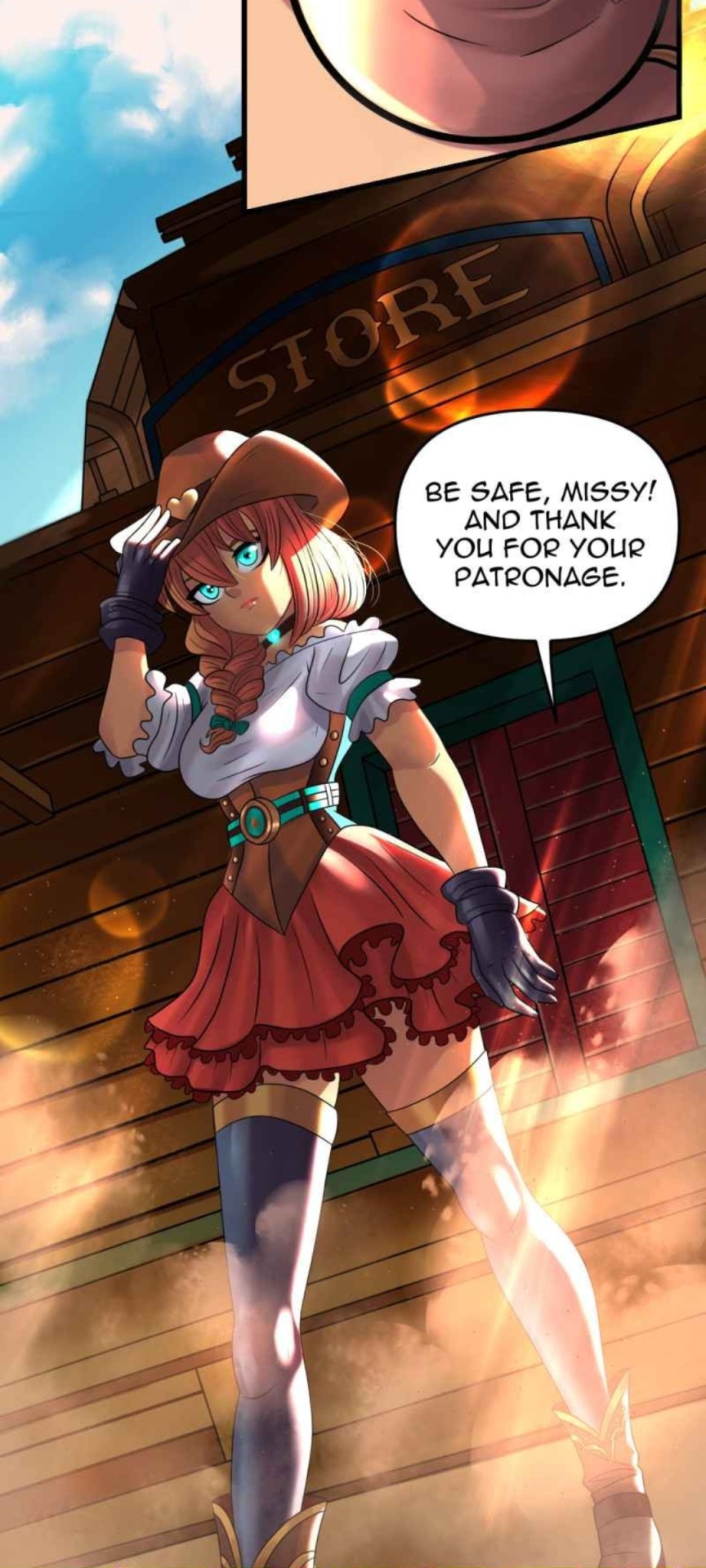
The story kicks off when inmate no. 7012, Molly Holliday, is imprisoned on Purgatoire, a perilous frontier planet styled after the wild west, with only one hope, “complete the necessary steps required to reform and join the rest of civilized society...”
Molly soon catches the eye of Tess “Tombstone” Seguín, a steely-eyed gunslinger doing “accidental good” working as a bounty hunter for Reach. Between all the imprisoned criminals running amok, the settlers looking to carve out their own tiny chuck of hellscape and live in peace on Purgatoire don’t have it easy. So, Reach marks those who misbehave and promises that those who join Reach and hunt down enough evildoers will receive the ultimate prize, a one-way ticket to freedom.
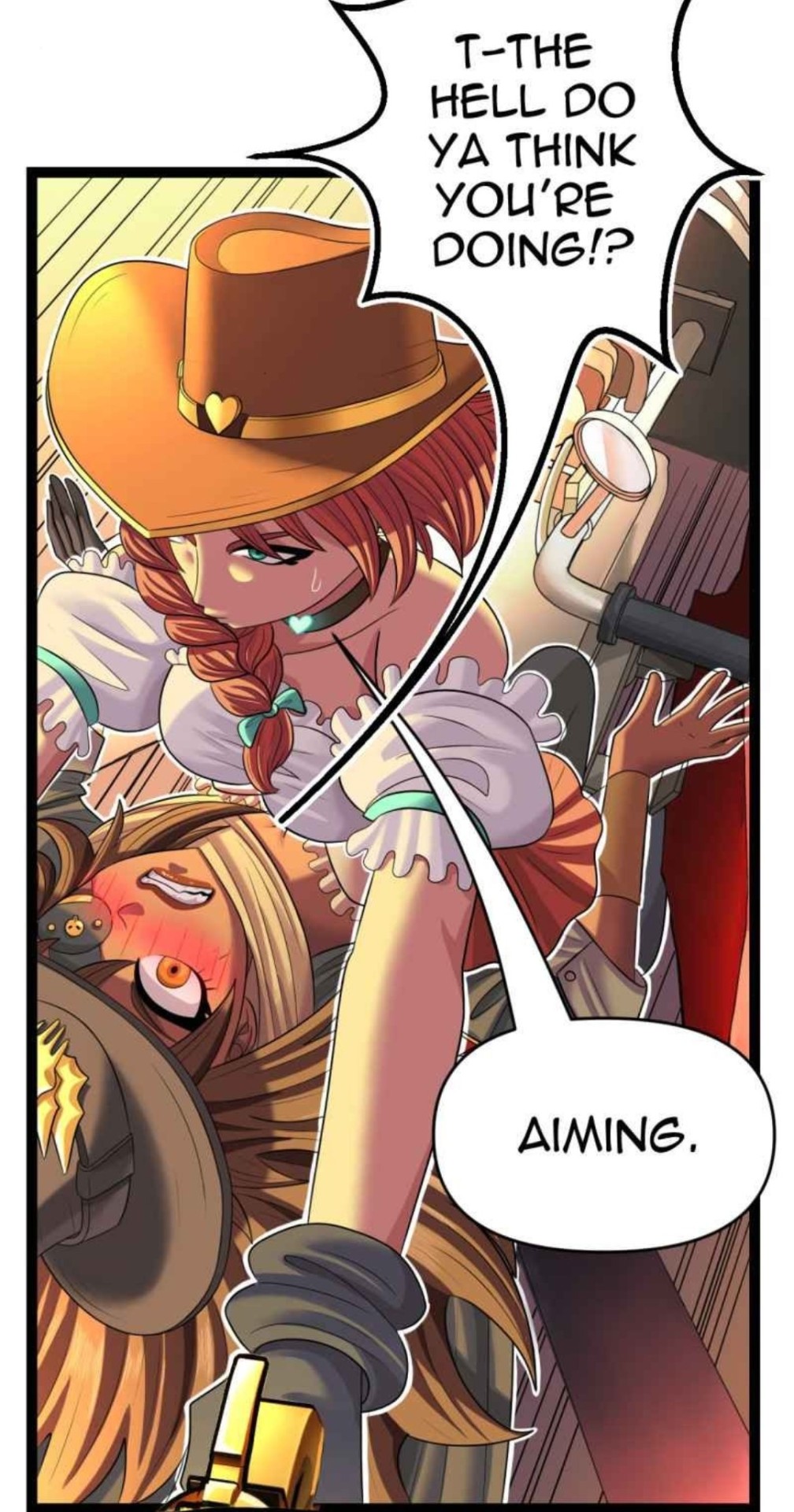
After successfully proving her quickdraw skills, demonstrating the sharpness of her cutting tongue, and instilling more than a little lesbian panic, Molly proves herself to Tess, who invites her to join her gang, The Red Horns, aboard their space train, The Apollonia. Together they’ll stop at nothing to earn their freedom as they annihilate scum and battle against the six wicked gangs that carved up the planet’s territory and rule it with an iron fist. And if the Red Horns should accidentally do some good as they ride off into the sunset, so be it. These aren’t heroes by any means, just selfish monsters who happened to end up on the right side of the law after breaking it.
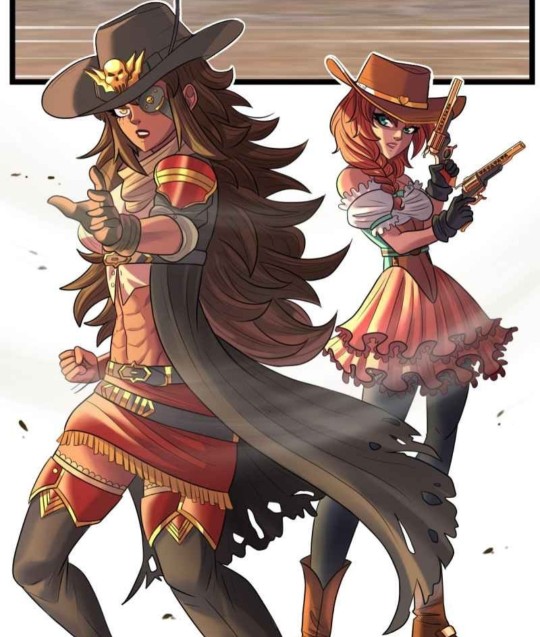
The series boasts dramatic visuals that electrify action as plasma bolts and explosive punches fly in dynamic, stylized sequences. And from incredibly sculpted abs to genetically engineered heart eyes, each of the character designs helps communicate its subject’s personality and power. The world-building is excellent, showcasing a dangerous world inspired by Borderlands and technology that justifiably mixes high-tech sci-fi with the aesthetics of classic Western stories. However, my favorite element is the dialogue, laden with a plethora of old-west slang, witty exchanges, and plenty of flirtatious banter between the two female leads.
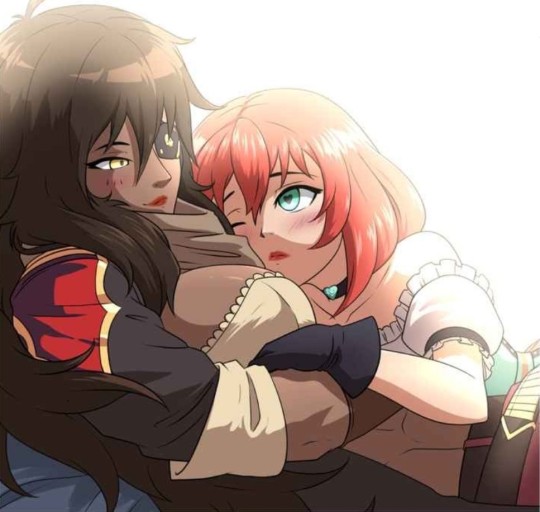
You can read Apollonia for free today on Webtoon.
Post sponsored by War Bunny
272 notes
·
View notes
Note
Do you have any good omens fic and wip recs?? looking for AUs mostly
sure!! here are some of my favourite AU wips rn:
On Thin Ice by blairamok (M, 3k, 1/?)
Aziraphale Fell and Anthony Crowley are the nation’s two most prominent figure skaters.
Anthony is an Olympic gold medalist and reigning World Champion of men's singles, with countless other accolades under his belt, both notorious and beloved for his rebellious nature and reckless abandon on ice. Aziraphale is a rising star shooting straight for Anthony's claim to fame.
Their intense rivalry is a phenomenon that takes the world by storm.
Heavenly Wicked Cafe by WaitingToBeBroken (T, 3k, 1/?)
There is a terribly rude barista that makes amazing coffee and a saint of a barista, whose coffee tastes vile.
And they are in love.
London, Libraries & Love by wolftea (E, 15k, 8/19)
Smiling warmly at the huddles of students, Aziraphale made his way over to Crowley, who was leaning against his desk. Crowley was dressed in layers of all black (as per usual), his red hair was tied back in a loose ponytail (not as usual, he often wore it down) and he was twirling Aziraphale’s fountain pen between his fingers.
“Mister Fell.” Crowley drawled, but the warmth in his amber eyes and the upward curve of his mouth betrayed any attempt at appearing nonchalant.
Aziraphale found himself grinning. How on Earth had he ever disliked this man?
“Crowley.” He said, eyes crinkling as he plucked the pen out of Crowley’s hands and put it back by his notebook.
There is a Light & It Never Goes Out by PhoenixRose314 (M, 27k, 5/26)
It had seemed like such a good idea. Running away to a remote, virtually uninhabited wild island, do some research for his latest paper, forget all about his nagging family, his coercive boss, the absolute mess he'd made of his life back in Soho... for five months, Aziraphale could just focus on work, get used to being lonely, and accept that love was not meant for someone like him.
That had been the plan, anyway.
Big Name Feelings by ghostrat (E, 29k, 5/16)
FANDOM AU! • Crowley is a BNF fic writer, and Aziraphale is a lurking artist who might be just a little parasocially in love with him. How they ever became friends is beyond him, but here they are: One month out from Prophet Con, and Crowley is asking him to be his boyfriend. Just for the weekend, of course.
and now all of my garden is grown in lavender by ilikeblue (E, 63k, 12/14)
Popular queer romance author, A.Z. Fell, has been lying about having a husband and a happy marriage for years. Longing to escape a string of failed relationships and looking for a fresh start, Aziraphale moves into the cottage left to him by his Great Aunt Agnes. When a TV adaptation of one of his books leads to sudden popularity and throws him into the limelight, his fans (and the press) are eager to catch a glimpse of Aziraphale's own mysterious leading man. Unfortunately, he still has to cast someone for that role. Enter the handsome gardener…
Under Crowley's meticulous care the cottage's neglected garden slowly comes back to life, and Aziraphale finds himself writing the most important love story he'll ever write: his own
you can find some more good omens AU recs here
also everyone pls feel free to add your wip recs to this post!!
#if u are looking for smth more specific pls tell me (@ everyone) 💜#anon#answered#good omens fic#good omens fic rec#good omens au#good omens human au#aziracrow#aziracrow au#aziraphale x crowley#good omens#good omens fanfic#foolish recs#wip wednesday#ineffable husbands
61 notes
·
View notes
Text
Things about Cinderella's Castle I'm excited about already as a big Cinderella fan

THE PUPPETS!!! I love puppets and I love seeing puppetry get used more and more—it's such an underrated art form! And the puppet models look stellar!
I love the idea of the step-family being trolls. I was wonder if they were always trolls or if they got sort of cursed. But Step-Mom flays women and wears their skin to fool everyone??? Very Grimms Bros style, I love it. I don't mind dark takes on Cinderella, so I'm intrigued. I wonder if that's why they're jealous of Ella, cause she's a normal human (supposedly), and so they try to demean her like a troll, to get her on their level or something.
With characters like Sir Hop-a-lot and Crumb, I'm curious what their role is. Are they Ella's animal friends that she gave goofy names? Sir Hop looks like he's a part of the royal court in some way, so does he somehow work for the prince? Will it be kind of like Wicked where the anthro-animals are a race amongst humans? Are they looked down on like the trolls? Is it fair that either group is looked down on?
CRUMB! Crumb is a perfect name for the mouse! I'm shocked I've never heard of a mouse named Crumb before.
I've talked before about how I see the early Disney princes as symbols of their princesses' freedom rather than characters and that's why they're "flat". I like that the prince in this show sounds like a parody of that. Like, "What if that flat 'character' was treated like a real character, but still with a similar flatness to him?" I like it. I trust Starkid to do that well.
I'm currently theorizing that Kim's Fairy Queen character will be a combo of sleeping beauty and the fairy godmother, based on her description in the 4/6 live stream and description of the video announcement saying "Kim will awaken the Fairy Queen from her slumbering prison in the realm of death". I don't even know if they'll implement other fairytales into this particular show, but I'm excited.
I love the possibility of a fairytale multiverse from Starkid. Hope that happens one way or another.
WOC CINDY! WOC CINDY! WOC CINDY!
I'm hoping for sapphic Cindy too, Mariah's comment got my hopes up. I'm trying not to get too attached to that idea, but as a lesbian woc that would kill me to see. Correct me if I'm wrong, but SK hasn't had a main queer couple since Firebringer, so it'd be cool to get for me, especially since Cinderella's my favorite fairytale and theater is one of my favorite mediums to consume stories with.
I've seen people theorize that the song in all the trailers is from a bard's perspective. I get that vibe too.
I know I sound like a 5-year-old, BUT I'M SO EXCITED TO SEE WHAT THE BALL GOWN WILL LOOK LIKE! The cover of the 4/6 livestream seemed to give us a slight taste of it. This gold and purple ensemble maybe. Purple is typically the color of royalty, so I love the idea of incorporating it in Ella's dress. And I like the use of rhinestones in her makeup. I wonder how they'll do the dress transformation if they do it. I actually hope we don't see it in its entirety till the show is on stage; I don't want the reveal spoiled.
One thing about Cinderella that's very important to me is the abuse aspect of the tale. Depending on how similar this show is to the traditional version of the tale, I hope it's not ignored. I'm pretty sure it won't be.
EDIT: I made another list of things after the 4/13 livestream
33 notes
·
View notes
Note
I’m curious why you loathe the implication that wizards are immune to muggle diseases. Is it because it reinforces the idea that they aren’t really the same species as muggles?
thank you very much for the ask, @urupotter!
and the answer is - yes, pretty much.
how the body is understood, how illness and disability are thought about, how the medical system works etc. are all questions that i am primed to obsess over in any piece of media - even when they're not actually significant parts of the story.
which is to say, i completely understand the reason why the harry potter series treats these topics in the way it does. magical medicine isn't one of the themes the story is designed to focus on - which means that its purpose is as incidental worldbuilding detail which reinforces the whimsical vibe of the earlier books and the darker vibe of the later ones, and which means that its treatment in the text makes sense within the setting and genre conventions of canon. harry being able to take a bludger - a cast-iron cannonball moving at speed - to the head and living to tell the tale is the same as john wick being able to fall from a great height, land on his back, and then get up and walk around: he's an action hero in a fantasy.
and so wizards being more physically durable than muggles - and also wizards having their own magical diseases, and being immune to muggle ones - all makes sense within the context of the books as literature. kids don't want to read about harry having a cold. they want to read about him being a wizard.
but when i'm deciding to enjoy myself by taking the question of just how fucked-up wizarding society is much more seriously than canon does... the implication that wizards are immune to muggle diseases and that they are broadly unaffected by physical trauma unless that trauma has a magical cause really bothers me. entirely - as you say - because it directly undermines the series' thesis that the purity of magical blood is irrelevant and that the wizarding world's dehumanisation of muggles and muggleborns by treating them as, essentially, separate, lower species is wrong.
the main canon example of this which i detest is dumbledore's suggestion in half-blood prince that merope gaunt could have survived childbirth if she'd simply "raised her wand to save her own life". after all, if a little bit of magic makes one immune to experiencing complications during childbirth [unlike thousands upon thousands of muggles throughout history, who would probably have very much liked to have lived to see their children grow up]... then voldemort is completely justified in thinking merope's death was a selfish, shameful, deliberate choice.
[i do understand that the idea merope chose to die is primarily included in the text so dumbledore can segue into saying that lily "had a choice too", contributing to the gradual reveal in half-blood prince and deathly hallows that she's the key to the whole mystery. but i still think that jkr could maybe have though a little bit harder about what she was suggesting with this than she evidently did...]
and so i think in fandom it's both fun and important not to accept the idea that wizards are automatically resistant to anything which might kill, injure, or disable a muggle - especially because it lets us really play with some of the big worldbuilding questions surrounding the conventions and institutions of wizarding society.
what do disability rights look like in a world which is so rabidly intolerant of difference, and which appears not to have any sort of welfare state? the nhs is a recent invention, created in a muggle britain which is culturally and institutionally separate from the wizarding one: so is treatment at st mungo's free - and, if not, what happens to those who can't pay? how is queerness understood in a society which appears to have views on sexual expression which are fairly conservative - and how does this mean the wizarding state responded to the aids crisis? what do reproductive rights look like in this kind of society? if the dementor's kiss results in - essentially - a vegetative state, what is done with the people the kiss has been performed on? what might it be like for your relative to develop dementia at 100... when you know they might live to 250? what impact do biases about blood status have on how muggleborn patients are treated?
i just think it's interesting!
28 notes
·
View notes